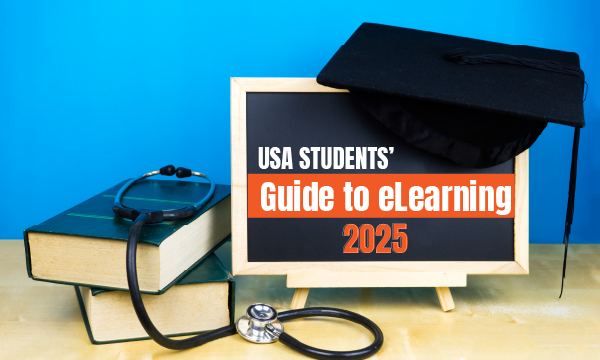Popular Online Learning Platforms in USA for Students in 2025
Table of Contents
Online learning platforms in the USA have become a game-changer for students in 2025. Tuition fees for traditional degrees can range from $30,000 to $50,000/year. Every day, learners are turning to affordable online options, such as Coursera, Udemy, edX, and LinkedIn Learning.
These platforms offer flexibility, access to top professors, and the opportunity to upskill for a career. All of this happens from the comfort of your student accommodation or even while commuting. In this guide, we will talk about the most popular online learning platforms in the USA.
Why are online learning platforms vital for students?
Since the pandemic, the shift among students towards mixed and remote education has only grown stronger. Additionally, it is anticipated that the global e-learning market will surpass $ 400 billion by 2026. Many surveys have also shown that nearly 70% of students worldwide took at least one online course in the past year. Here’s why online learning platforms are so popular in the USA:
- Flexibility & Accessibility: Students can learn things at their own pace. They can do so at any time and from anywhere. It is known to adapt to your schedule.
- Affordable & Wide Range of Courses: Compared to traditional classes, online platforms offer significantly lower costs. Many even offer free modules or financial aid.
- Global Exposure: These platforms feature professors from renowned universities such as Harvard, MIT, or Oxford. This means that you can access education from the comfort of your student accommodation.
- Career-based skills: Fields such as AI, Data Science, and Cybersecurity have been experiencing significant growth. Coursera’s 2024 report stated 85% of learners enrolled in tech-related courses felt its benefits. That too within a year.
Which online learning platforms are most popular in the USA?
The most popular online learning platforms in USA in 2025 are Coursera, Udemy, edX, Khan Academy, LinkedIn Learning, Skillshare, and MasterClass. These platforms dominate because they offer students flexibility without compromising their credentials. Plus, you will have recognition that comes with traditional study. Below, we will talk about each platform and its pros and cons:
Coursera
Coursera is one of the largest names in online learning. It partners with many top universities like Stanford, Princeton, and Yale. Below are its pros and cons:
Pros:
- The biggest win? Coursera Courses are university-backed. This means the certificate carries real weight with employers around the world.
- Here you will find everything from free lessons to full-time master’s courses. So, there’s something for every learning stage.
- Coursera also works with companies like Google and IBM. So, a lot of the training is directly linked to jobs that are in demand.
- Unlike any casual platforms, Coursera includes graded assignments. It is followed by peer-reviewed projects. This makes it feel closer to a real classroom.
Cons:
- The flip side is cost. Once you move past free courses, subscriptions and full degrees can feel heavy on the wallet.
- Some courses stick to rigid weekly deadlines. This can be stressful if you prefer self-paced study.
- The catalog leans mostly toward academics and career tracks. So if you’re after creative or hobby courses, you might feel a little limited.
Udemy
Udemy is often the go-to for students who want quick, practical learning. That too, without spending too much. It has more than 200,000 courses taught by independent instructors worldwide. It’s a platform where you can pick up almost any skill. Below are Udemy’s pros and cons:
Pros:
- Courses are usually very affordable, thanks to frequent discounts and flash sales.
- Once you buy a course, you get lifetime access, so you can revisit lessons anytime.
- The variety is massive. You’ll find everything from career skills to niche hobbies.
- User ratings and reviews make it easier to figure out if a course is worth your time.
Cons:
- Because anyone can teach, the quality varies a lot from one course to another.
- The certificates you earn are not widely recognized by employers.
- There’s no fixed path or structure of courses. And with so many choices, it’s easy for students to feel a bit lost.
Khan Academy
Khan Academy is a non-profit platform. It focuses on helping students become better at the basics of subjects like math, science, economics, and test prep. Many school and college students in the USA use it to strengthen their fundamentals. Or they use it to prepare for exams like the SAT or MCAT.
Pros:
- It is completely free to use. This makes it such a lifesaver for students on a budget.
- Plus, it also offers practice quizzes and progress tracking. It will help you see how you are improving every day.
- This one has got to be a super handy place for standardized test prep like SAT, LSAT, MCAT, and more.
Cons:
- It does not go into too much depth into professional or career-focused skills.
- No formal certificates to show on a CV or LinkedIn profile.
- The teaching style is quite basic, so it may not suit advanced university-level learners.
LinkedIn Learning
LinkedIn Learning is one of the most popular platforms in 2025 for students who want career-oriented skills. It connects directly with your LinkedIn profile. So, whatever you learn shows up where recruiters can directly see it.
Pros:
- It has a huge library of 16,000+ expert-led courses. That too across fields like tech, business, and soft skills.
- Certificates can be added straight to your LinkedIn profile. This boosts job visibility.
- Personalized suggestions recommend courses based on your career interests.
- It is perfect for students looking to upgrade skills for internships or jobs.
Cons:
- Subscription costs can feel high, especially if you are not using it regularly.
- The catalog is more career driven. So it’s lighter on hobbies or creative subjects.
- Some courses feel too lecture-style, which might not click for hands-on learners.
Skillshare
Skillshare is a platform that is all about creativity and entrepreneurship. This place is for someone who is into design, photography, or even starting a small business. Here you will find practical courses. Unlike any rigid academic platforms, Skillshare feels more like a community of creators sharing about what they know.
Pros:
- Its affordable subscription gives you unlimited access. That too for thousands of classes.
- Perfect for creative fields like animation, filmmaking, and freelance business skills.
- Project-based lessons will help you create a real portfolio.
- It has got community and workshops that make learning feel interactive and collaborative.
Cons:
- Classes are often shorter and may not dive deeply into complex topics.
- No formal certificates or university recognition, so it’s more for personal growth.
- Works best if you’re self-driven, since there isn’t much structure or deadlines.
MasterClass
MasterClass is a premium learning platform where the teachers are world-famous experts. You can think about Serena Williams teaching tennis and Gordon Ramsay teaching cooking. It’s less about exams and more about learning directly from people who are best in their field.
Pros:
- You get to learn from icons and celebrities. This makes learning super inspiring.
- Lessons are filled with cinematic quality. Thus, making it feel like Netflix for learning.
- It focuses on personal growth and creativity.
- One yearly membership unlocks all courses, so you can explore widely.
Cons:
- More expensive than most platforms (around $120/year).
- Very few interactive tools like assignments or quizzes.
- Courses are inspiring but not always practical for career-focused skills.
Is online learning cheaper than in person?
Online learning in 2025 is significantly cheaper than in-person classes. This often costs just a fraction of traditional tuition fees. A US in-person degree can cost $25,000–$50,000/-year. On the other hand, online courses range anywhere from $20/- short course to $10,000 for a full online degree. A 2024 Statista report showed that nearly 65% of US students chose online platforms for affordability. Here’s the breakdown of online learning platforms in USA costs:
- Short Courses (Udemy/Skillshare): $20–$40/course. Or $12–$20/month subscription.
- Professional Certificates (Coursera/edX/LinkedIn Learning): $39–$79/ month. Some certificates total between $1,000 and $2,000.
- Full Online Degrees (Coursera/edX): Between $8,000–$15,000. It is significantly lower than $ 30,000 at US universities.
Do online learners in the USA need student housing?
Many students using online platforms in the USA still choose student accommodation. The reason is that they combine online learning with in-person classes, internships, or part-time jobs. According to a 2024 survey, over 70% of online learners in the USA lived in shared student housing while also doing hybrid or in-person activities. Here’s why:
- Hybrid Learning: Many US universities run blended courses. Students attend some classes online and some on campus. So being near campus still matters.
- Internships & Jobs: Staying in student accommodation near the university makes commuting to part-time jobs much easier.
- Community & Networking: Student housing connects learners with peers. This doesn’t happen in online classes.
- Facilities for Learning: Most student apartments include high-speed Wi-Fi, quiet study lounges, and co-working spaces.
So while online learning cuts tuition costs, student housing in the USA still plays a key role in giving international students a complete study-life balance.
Conclusion
At the end of the day, online learning platforms aren’t replacing universities. They’re complementing them. Whether you want to boost career skills or prepare for exams, there’s something for every type of student in 2025. Plus, with affordable subscriptions and global recognition, online learning gives you real value without the financial strain of traditional degrees.
Ready to make your study journey easier? Explore verified student housing near top US universities with University Living, and enjoy a balance of study, networking, and comfort.
Frequently Asked Questions
What is the most popular online learning platform in 2025?
Some of the popular learning apps include Udemy, Coursera, Skillshare, LinkedIn Learning etc. Udemy is loved for cheap short courses. While Coursera is known for university-backed degrees.
Which is the biggest education platform in the world?
There’s no single leader. But Coursera and Udemy are the largest education-based platforms in the world.
What are the most successful online courses?
The most popular online courses are Programming, Business, Computer Science, Data Science, Humanities, Arts & Design, and Social Sciences.
How much does Coursera cost per month in 2025?
Coursera Plus is priced at $59/month. Or you can pay $399/year for unlimited access.
What is the most downloaded education app?
Duolingo leads the chart with 16 million+ downloads in 2024. This makes it the top global education app.


